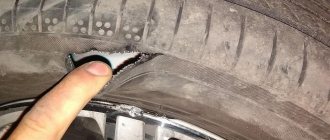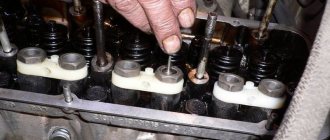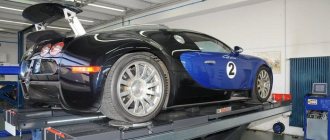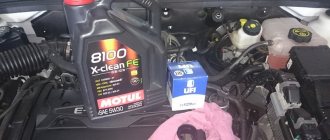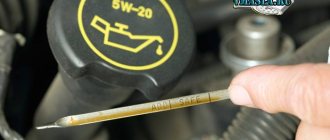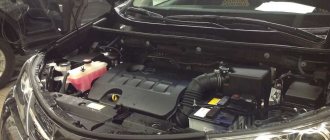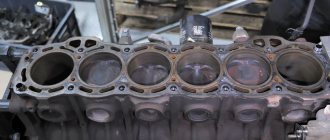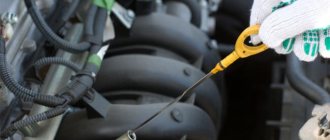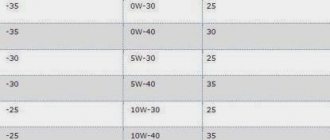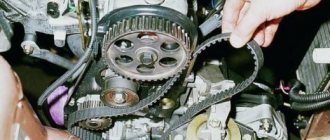If the internal combustion engine suddenly starts knocking, it is recommended to carry out diagnostics to identify possible malfunctions and the causes of their occurrence. Engine knocking is considered one of the most alarming situations, as it can mean that the car requires expensive repairs. As a rule, knocking occurs as a result of deformation of parts of the power unit resulting from wear or strong impact. At the same time, in places of mutual contact of deformed elements, loads sharply increase with subsequent destruction.
Possible causes of knocking in the engine
To accurately find the cause, a qualified inspection of the internal combustion engine is necessary using special diagnostic equipment. The main reasons that occur most often:
- Defects received during the manufacture of a car (on a new car).
- Poor quality repairs (for example, in a regular garage).
- The engine crankcase is filled with the wrong brand of engine oil.
- Using low-quality gasoline or diesel fuel.
- Violation of vehicle operating rules (motor overload, aggressive driving, etc.).
A knocking sound appears in the engine for no apparent reason; this occurs after a long run, as a result of gradual wear of working units and parts exceeding the maximum permissible values. If unusual sounds occur, the technician must make sure that it is not the gearbox or other transmission mechanism that produces them, but the engine. Based on the nature of the sound, an experienced mechanic determines the location and degree of complexity of the breakdown. This applies to internal combustion engines of any type: carburetor, injection, diesel.
Causes
- Impurities and metal particles in motor fluids, despite the presence of filters, pass into the engine. No one is saying they don't filter well, but you can't catch everything;
- Long-term operation of the old filter;
- The oil is of poor quality;
- Low oil level, as a result of which the bearings do not receive enough lubrication;
- Wear or defect on the shaft journal. There are cases of selling shafts after an accident. As a rule, they are bent at the micron level; the eye will not notice this. The engine will definitely knock;
- There is foreign liquid in the oil. Water, antifreeze;
- No oil at all;
- On a cold start the sound is dull and dull, but when warmed up it becomes ringing.
{banner_content} Camshaft:
The knock appears due to wear of the bearings, the reason for this is the above. Experts assure that such an engine can be driven for no more than 40-50 thousand km, if the valves are without hydraulic compensators, otherwise not.
Initially, the knocking will occur during a cold start, then while driving. During early fuel delivery on gasoline and diesel engines, the mixture is pre-ignited. People call it: fingers are knocking and diesel is slurring.
Valves:
Increased clearances due to wear are the main cause of knocking. The sonority is similar to the sounds of a camshaft. A diesel engine may have a knocking noise from the high pressure fuel pump.
"Fingers are knocking":
You can often hear such words from experienced drivers. This is mainly a problem with carburetor engines, which are fading into oblivion. The scheme is as follows: the mixture enters the combustion chamber, the piston compresses it and at this moment a spark passes through. So the moment can be ahead or late. Hence the names “early” and “late” ignition. Eliminated by turning the trampler angle to the left or right.
Engine detonates:
Non-standard combustion of fuel in the combustion chamber. With a norm of 1.5–2.5 m/s, the actual value is an order of magnitude greater. Signs: clattering noise in the cylinders, swaying of the engine from side to side, heating of the cylinder head, sharp decrease in power. Read the article “Causes of Engine Knock” for more details.
As we can see, the signs that the engine has knocked are quite extensive. It is unlikely that you will be able to determine the source of the knock by ear; you need to seek help from specialists at a car service center.
Primary diagnosis of engine knocking
To make sure that unusual sounds are coming from the motor, you need to:
- install the vehicle above an inspection hole or on an overpass;
- depress the clutch pedal;
- disconnect the engine from the gearbox and transmission;
- check the condition of parts and components that are the most likely culprits for the appearance of extraneous knocking noises (engine mounts, water pump, generator, etc.);
- dismantle parts that cause suspicion;
- If the unusual sounds do not stop, this means that the main problem is in the motor itself.
Knocking noise at high engine speeds
The cause of strange sounds coming from the engine may be detonation. It occurs due to early ignition of the fuel-air mixture, which causes knocking. Some drivers describe the sound resulting from detonation as a ringing sound that occurs only at high engine speeds. The fact that the problem is detonation may be indicated by the “Check Engine” light coming on on the dashboard.
The reason lies, as a rule, in low-quality fuel or fuel with a low octane number. For example, your engine is configured to run on 95 gasoline, but you mistakenly or deliberately filled it with 92 gasoline. The consequences of detonation can be quite serious - overheating of the combustion chamber, as well as the appearance of deposits on the cylinder walls as a result of incomplete combustion of fuel.
Types of engine knocks
Experienced auto mechanics can distinguish non-standard extraneous sounds that appear during operation of an internal combustion engine by hearing based on a number of signs:
- The strength of the blows.
- Increasing intensity of sounds.
- Harmonic frequency.
- Cyclicality.
Depending on the strength of the sounds coming from the operating unit, it is recommended to perform the following actions:
- if the impacts are very strong and cannot be damped by any available means, it is best to turn off the engine and deliver the vehicle using a tow to the nearest service station;
- with medium impacts, which are not audible when you turn on music in the car interior, it is allowed to slowly move independently to the repair shop;
- It is possible to diagnose the cause of the impacts not immediately if the noises coming from the internal combustion engine with the hood open in conditions of complete silence are barely audible.
Advice for car owners
If a driver asks what to do if the engine knocks, the answer is simple - find the cause and fix it. This can be done with your own hands or in one of the service centers in Moscow.
Sometimes it turns out that the driver, due to an independent “diagnosis,” decides that the problem is in the engine and sends the car for major repairs, but it turns out that this is absolutely not the case.
If engine knocking is detected on the road, it is not recommended to continue the journey, as this may lead to irreversible consequences. Therefore, it is better to immediately go to the nearest service station and contact the professionals in their field. But if there are no increasing sounds in the hydraulic compensator, fuel injection pump, or timing chain, continue driving.
Mark Hugo » 24.05.2009 6:13
Re: Engine knocking when revving up
alekom777 » 24.05.2009 9:59
Re: Engine knocking when revving up
Mark Hugo » 24.05.2009 15:01
Re: Engine knocking when revving up
MVS » 25.05.2009 8:50
Re: Engine knocking when revving up
pro_s » 25.05.2009 9:23
Re: Engine knocking when revving up
Mark Hugo » 25.05.2009 13:01
Re: Engine knocking when revving up
MARKS » 25.05.2009 13:24
Re: Engine knocking when revving up
tosla » 25.05.2009 13:34
Re: Engine knocking when revving up
Mark Hugo » 25.05.2009 14:36
Re: Engine knocking when revving up
MARKS » 26.05.2009 8:16
Yes, you can hear the valve at XX, but sometimes it happens when the valve springs are tired, at high speeds the valve does not have time to press out so as to “lick” the camshaft cam and then a knock occurs, while at XX you can’t hear it - everything is done in time. In case of wear, the GN may not provide the required tension force and then the chain will have an oscillating branch and slack, which is why there will be a chatter, and most often at rpm.
Re: Engine knocking when revving up
Mark Hugo » 26.05.2009 9:37
Re: Engine knocking when revving up
Mark Hugo » 19.06.2009 12:44
Re: Engine knocking when revving up
DEVIL » 21.06.2009 19:58
Re: Engine knocking when revving up
samyrai » 21.06.2009 20:43
Re: Engine knocking when revving up
Mark Hugo » 21.06.2009 23:50
Re: Engine knocking when revving up
antonatom377 » 30.03.2019 10:15
Bro, give me your contact or write back, what happened and how you treated it? I’m racking my brains, I have a similar problem, exactly, I don’t know seriously, no, it doesn’t give me peace, just worry. A lot of time has passed, did you somehow solve the problem? At first I have a rattling noise at 2000 rpm. disappeared when I changed the oil, then seemed to appear again, or maybe I just didn’t pay attention. Tell me what is this?
Re: Engine knocking when revving up
alekom777 » 01.04.2019 21:31
- Related Topics Comments Views Last Post
- Knocking in the Guf-Rolex-X engine » 10/21/2013 7:13 in the forum Maintenance and operation 16 4755 TAKH 08/31/2014 7:05
- Whistle under the hood when accelerating? kolean » 12/11/2013 13:36 in the forum Maintenance and operation 1 1149 TAX 12/11/2013 13:54
- 1 knock when starting and 1 knock when braking + nesteroole rattles" 10/25/2014 23:01 in the forum Maintenance and operation 11 2625 Andro /> 11/02/2014 16:54
- It stalls up to 4 thousand revolutions twins » 11/05/2013 21:25 in the forum Maintenance and operation 1 1198 TAKH 11/07/2013 8:20
- Replacing spark plugs on a VQ25DD engine nickolla24 » 04/09/2014 22:35 in the forum Maintenance and operation 3 2261 TAX 04/13/2014 23:22
- the chain rattles on a warm engine CEFIROVOD582 » 01/13/2016 18:05 in the forum Maintenance and operation 2 1298 TAX 01/14/2016 17:19
- High speed on a warm A32 engine pashtet898 » 10/06/2016 12:51 in the forum Maintenance and operation 6 915 Rezist 10/10/2016 11:32
What does impact intensity mean?
If a clear knocking sound in an internal combustion engine appears unexpectedly and does not disappear over time, this means that the working parts are rapidly deteriorating due to the operation of the machine under high load conditions. The result of destruction is exceeding the cyclic fatigue limit of the metal.
If the knocking began with barely noticeable manifestations and, over time, began to gradually intensify to an impossible rumble, this indicates gradual abrasion and wear of metal surfaces.
Important: The intensity of the increase in the sound of impacts depends on the modes in which the vehicle operates: the load on the power unit, the crankshaft speed. When the permissible loads on an internal combustion engine are exceeded, the wear of parts of the cylinder-piston group and the crank mechanism increases. The main sign of defects that have appeared in these groups of elements is an increase in the intensity of extraneous sounds, turning into real noise, with increasing loads.
The intensity of non-standard engine sounds also depends on the quality of lubrication of friction units. List of working pairs in which parts interact closely:
- pistons with piston pins;
- camshaft with cylinder head;
- valve bushings;
- cylinders with pistons, etc.
Thanks to the beneficial properties of motor oil, the friction forces between mating metal surfaces are significantly reduced. As the load on the engine increases, the supply of lubricant increases. It is believed that due to the accumulation of a large amount of lubricant in the area of operation of worn components and parts, the intensity of impacts and noise effects is reduced.
If the KamAZ 740 engine knocks. Reasons.
The appearance of a knocking sound when the KamAZ 740 engine is running. Possible causes and methods of troubleshooting.
If an extraneous metallic knock is heard while the engine is running, operating the engine until the cause of the breakdown is identified and eliminated is strictly prohibited. Possible malfunctions leading to knocking in the engine are shown in the table. It also indicates what repair work needs to be done.
| Knock when the engine is running | |
| Early injection of fuel into the cylinders. | Adjust the fuel injection advance angle. |
| Increased thermal clearances in the gas distribution mechanism | Adjust gaps. |
| - Wedging of the valves of the gas distribution mechanism in the bushings (the piston touches the valve) - Breakage of the valve seat with the cylinder head and fragments getting between the cylinder head and the piston | -Disassemble and wash the valve mechanism. If necessary, replace the valve. -Replace the block head. If the engine has been running with knocking noise for some time, replace the damaged piston. Check the integrity of other elements and the absence of damage to the sleeve. |
| Increased cyclic fuel supply (rack lock disengaged) | Replace the injection pump rack |
| The knock of the crankshaft is dull . The frequency increases with increasing engine speed | |
| An unacceptable increase in the clearance between the journals and main bearing shells as a result of the use of oil that does not comply with that specified in this manual, or a decrease in pressure and oil supply. | Grind the journals to the repair size and replace the liners, change the oil and check the operation of the oil pump. |
| Inadmissible increase in the gap between the thrust half-rings and the crankshaft. | Replace the thrust half-rings with new ones of greater thickness. |
| Loosening the bolts securing the flywheel to the crankshaft. | Determine the cause and tighten the bolts. |
| The knock of the connecting rod bearings is sharper than the knock of the main bearings. It is heard when the engine is idling and intensifies with increasing crankshaft speed. | |
| An unacceptable increase in the gap between the journals and shells of the connecting rod bearings as a result of using oil that does not comply with that specified in this manual, or reducing the pressure and oil supply. | Grind the journals to the repair size and replace the liners, change the oil and check the operation of the oil pump. |
| The sound of the pistons is muffled and is caused by the beating of the pistons against the cylinders. Can be heard at low engine speeds and under load | |
| Unacceptable increase in the gap between pistons and cylinders. | Replace pistons and, if necessary, cylinder liners. |
| Severe wear on the ends of the piston rings and the corresponding grooves on the piston. | Replace piston rings and, if necessary, pistons. |
| The knocking of the piston pins , double, metallic, sharp, is caused by a large gap. Better heard when the engine is idling | |
| Inadmissible increase in the gap between the pin and the bushing of the upper end of the connecting rod. | Replace the pin and, if necessary, the connecting rod. |
Characteristics of engine knocks
The sounds coming from an internal combustion engine vary in harmonics. They are voiced and deaf.
A characteristic metallic knock is heard in the engine if:
- There is contact between parts rotating at high speed.
- The material of their manufacture is carbide steel.
- If there is no high-quality lubricant when mating them.
A dull knock in the engine is heard under the following conditions:
- Interacting parts are made of steels of varying hardness.
- Small amplitude of movement of associated elements.
- At the points of their interaction there is a damping (shock softening) layer of lubricant.
Important: A loud knocking sound in the engine coming from the top of the power unit indicates beating of the valves. Sounds that resemble rustling are caused by problems with the timing belt (gas distribution mechanism). Pistons and cylinders make medium or low-pitched knocking noises.
What can cause the engine to knock and what should be done?
If the car's engine knocks (this can happen either immediately after starting or when the car is warm) and other extraneous noises are noted, this may indicate various problems. But in any case, the cause of the problem must be urgently found and eliminated, otherwise a serious breakdown is inevitable. Let's talk about why the engine starts knocking and what the driver needs to do in this case.
What causes engine knocking?
A knock inside the power unit means that its elements are hitting each other during operation. At the points of their contact, large shock loads occur, which lead to the destruction of the contacting surfaces. The louder the knock, the stronger the impacts, which means the parts wear out faster.
Causes of engine knocking
Extraneous sounds heard during internal combustion engine operation can occur for various reasons.
5 zones for listening when knocking on the internal combustion engine
The knocking noise made by the valves while the engine is running occurs due to:
- Broken valve spring.
- Severely worn camshaft lobes.
- Too large gaps in valve groups.
Crankshaft bearings may knock due to:
- Low oil pressure.
- Early ignition.
- There is too much gap between the liners and necks.
Pistons, as a rule, knock when they and the cylinders (rings with grooves) are too far apart from each other.
Light knocking sounds when the internal combustion engine is running under load, as well as detonation, can be caused by:
- Candles not intended for a specific power unit.
- The fuel is not the correct brand.
- A layer of carbon deposits formed on the piston heads, as well as on the inner walls of the combustion chambers.
- Faulty exhaust mechanism.
- Incorrectly adjusted ignition.
The camshaft drive can also make noise. In this case, their reason may be:
- Loose timing belt.
- Increased distance from the guide bushing to the valve stem.
- Worn camshaft cams.
- Increased distance from the camshaft levers to its cams.
Sometimes sounds are heard even when the wear of the elements has not reached a critical value, and the gaps are normal. In such cases, problems may be caused by a part being misaligned, seized, reduced oil viscosity, or excessive loads. If you quickly find and eliminate the cause of the noise before it leads to damage to the elements, the knocking will disappear.
Always, if the engine knocks, this indicates the need for immediate diagnosis. Having established the cause of the problem, you can decide what to do next. Sometimes, to eliminate a malfunction, you need to remove and completely disassemble the power unit, sometimes it is enough to partially disassemble the engine, and it also happens that the appearance of noise is not associated with problems in the internal combustion engine.
The engine knocks when cold
A slight knocking sound in the engine after starting, which disappears as it warms up, is a fairly common occurrence. It can be caused by various reasons, but in general it is not dangerous. To avoid problems, it is enough to warm up the car to operating temperature before driving.
Noise on a cold power unit usually occurs due to natural wear and tear of parts. When the engine warms up, its components expand, the gaps between them normalize and knocking noises disappear.
The engine knocks when hot
If the internal combustion engine starts knocking during a trip, it will most likely not be possible to fix the problem on your dream. An exception is a lack of oil in the system, when parts that are not properly lubricated are knocking. Therefore, when noises appear on a hot engine, first of all you need to stop, check the oil level with a dipstick and, if necessary, add it. If the knocking stops, you can continue driving.
If the reason is not lubrication, you need to pay attention to whether the noise increases when the power unit operates under load and whether the sound becomes louder when driving. Increased sound most often indicates faulty crankshaft bearings. Further driving without repair will most likely lead to a breakdown of the internal combustion engine and the need for expensive repairs.
If noises appear after filling with low-quality fuel (this happens when refueling at a dubious station), the problem can be solved by topping up with guaranteed high-quality fuel or adding an additive to the tank to increase detonation resistance.
“Quiet knocking”, which can occur for various reasons, usually does not pose a danger and can occur periodically without significant harm to the power unit. Therefore, if you notice the appearance of extraneous sound in the engine, you need to proceed from whether it becomes stronger or gradually subsides. If the engine knocks more and more intensely, it is dangerous to move further on such a car until the problems are corrected.
If you find an error, please select a piece of text and press Ctrl+Enter.
Article Rating
Tags: featured, engine, diagnostics, engine knocking
- Related Posts
- How to identify and eliminate fuel system faults?
- What does the color of the smoke from the exhaust pipe indicate?
- Why does a car engine stall and how to deal with it?
Subscribe
0 Comment
Inline Feedbacks
View all comments
Technical causes of knocking in the engine
During the long-term operation of a vehicle, a large number of defects and malfunctions arise, which often cause noise effects and unusual sounds that cause justified anxiety among drivers. Among the numerous signs and causes, the most likely factors include:
- Engine detonation, accompanied by a characteristic metallic knock.
- Failure of motor elements due to wear.
Detonation explosions occur due to failures in the distribution of air-fuel mixtures in the cavity of the working cylinders. Instead of uniform combustion, the fuel explodes, causing the cylinder walls to become deformed and the pistons to fail.
The main causes of engine detonation:
- a large accumulation of a thick carbon layer in the lower part of the piston and on the cylinder walls, which leads to an increase in the compression ratio of the fuel mixture;
- failure to regulate the moment of fuel ignition;
- fuel of inappropriate quality is used;
- malfunctions, failure of spark plugs;
- failure to comply with the operating conditions of the vehicle, which leads to additional loads on the internal combustion engine;
- overheating of the elements of the cylinder-piston group;
- malfunctions of components and parts of the exhaust system.
Tip: To minimize the incidence of engine knocking, it is not recommended to use the acceleration mode when overcoming steep inclines.
If knocking in an internal combustion engine is caused by wear, the reasons should be sought in the following:
- Failure of valve springs.
- Increased wear of the camshaft cam mechanisms.
- Faulty bearings - main bearings, connecting rod bearings, which support the crankshaft, increasing clearances.
- When the pistons wear, the gaps between the rings and cylinder walls increase.
- Wear of the distribution system parts leads to an increase in the gaps between the cams and the drive, and the timing belt begins to sag.
If no obvious wear of engine components is detected, but knocking is still present, this means that:
- the parts are located with some distortion and work with jamming;
- nodes are deformed;
- the viscosity of the motor lubricant does not correspond to the declared characteristics; a protective oil film does not form on the metal surfaces of the rubbing parts.
What can knock in the engine?
Crankshaft knock
Occurs due to large gaps in the connecting rod or main bearings, formed due to wear of the liners and/or shaft journals. In a working engine, the gap is small and amounts to approximately 0.020-0.040 mm; an increase in the gap to 0.070 mm for modern high-speed engines is unacceptable and indicates the need for repair. The reason for the increased gap may be:
- Mechanical impurities entering the bearing with oil. Oil filters do their job quite well, but if the filter is not changed for a long time, it will become clogged and a valve will open, which opens a bypass channel for oil, in cases where the filter capacity becomes insufficient to pass the required amount of oil (such a valve is not available on all commercially available oil filters)
- Poor quality oil. Unfortunately, now you can buy counterfeits of oil brands that are known all over the world and do not raise doubts about their quality.
- Insufficient amount of lubricant supplied to the bearings. This could be due to a faulty oil pump, a clogged oil filter that does not have a bypass valve, or a clogged oil passage (unlikely). In the event of such malfunctions, a light comes on indicating insufficient oil pressure supplied to the bearings.
- Unacceptable roughness or scratches on the shaft journals after repair or as a result of improper storage
- Unacceptable ovality of the shaft journals (or bearing beds), for example, after replacing the crankshaft with a supposedly good one, which turned out to be from a “knocked” engine or an engine that is about to start knocking. For this reason, when buying a crankshaft, be sure to measure all the shaft journals with a micrometer for ovality (up to 0.005 mm is allowed, in extreme cases up to 0.010 mm, but then the bearings will last a very short 5000-15000 kilometers)
- Presence of water or antifreeze in oil
- Engine operation without oil
These knocks are clearly audible when starting a cold engine, when the oil has not yet reached the bearings; In a certain range of crankshaft speeds, the knocking may disappear if the engine has just started knocking.
The tonality of the crankshaft knock is dull at idle and becomes louder as the rotation speed increases and is very frequent, even if only one bearing is knocking.
Camshaft knock
It is dull in tone and appears due to wear of the camshaft bearings, the reasons for which may be: poor quality oil, the presence of mechanical impurities or water in the oil, insufficient amount of oil supplied to the bearings, running the engine without oil, scratches, insufficient roughness or ovality of the journals ( which sometimes also occurs).
The fact that the camshaft is knocking is recognized by a dull knock when starting a cold engine, which disappears after oil begins to flow to the bearings (about 1-2 seconds). You can safely drive up to 50,000 km on such an engine, if only the valves are without hydraulic compensators, because When knocking, the camshaft moves (albeit very small) up and down. When the shaft moves upward, a gap is formed between the circumference of the cam (with the valve closed) and the pusher, and the hydraulic compensator will “select” this gap, and when the shaft takes the lower position, it will open the valve slightly (after all, there is no more gap), hence the drop in compression and, as a result, a drop in power, an increase in fuel consumption, a deterioration in engine starting performance, carbon deposits on the valve seat, overheating of the valve and possibly burning out.
As it wears out, the knocking will occur not only when starting a cold engine, but also when starting a warm engine, as well as when running a cold engine. The camshaft knock frequency is two times less than the crankshaft knock frequency.
With early fuel injection on diesel engines or early ignition on gasoline engines, detonation combustion of the air-fuel mixture occurs, accompanied by knocking noises. For gasoline engines, they say “fingers are knocking”; for diesel engines, the diesel engine operates harshly. Valve knocking occurs due to large gaps or, on engines with hydraulic compensators, due to their lack of oil filling. This knock coincides in frequency with the knock of the camshaft, and is sonorous in tone.
Also on diesel engines, the injection pump (high pressure fuel pump) may knock.
The piston may knock, pulling out the valves when the valve timing is off.
The next type of knock, in my opinion, is unusual and makes it difficult to identify a malfunction - this is the knock of the piston on the head, due to the fact that the head has become a little closer to the piston
. This happens due to installing a gasket under the head that is thinner than it should be or squeezing it too hard. A friend of mine had this problem.
He bought a TOYOTA CROWN 91 year old car with 3 years of mileage. Everything was fine, when suddenly, after 3 and a half months of operation, a loud, frequent knocking sound appeared in the engine (engine 1G-GZE), as it warmed up it became a little weaker, but did not disappear completely. There were suspicions about the crankshaft, but it was still confusing that the sound was loud. I disassembled the engine - the liners and crankshaft are in excellent condition, checked the valves and camshaft - everything is in order. One of the neighbors in the garage told him that the piston might be knocking on the head, and to find out, you need to carefully inspect the piston; there will be no carbon deposits at the point of contact.
That’s what I did - I looked through everything and, surprisingly, found a small spot without carbon deposits on the piston of the 4th cylinder. On the head opposite the piston in the same place there was a similar barely noticeable spot. I couldn’t even believe that such a strong knock was due to such nonsense. I lightly processed the piston with a file, bought a new gasket, assembled it and... no knock!!!
As it turned out later, the previous owner overheated the engine twice and then compressed the “head”, as a result the gasket was squeezed out greatly and, apparently, there was a small defect in the piston in the form of a protrusion, which was the cause of the knocking.
If extraneous knocking noises appear in the operation of your car’s engine and you are not sure of their nature, consult with friends and specialists (it’s better if both are one person), and maybe to eliminate it you won’t have to disassemble the entire engine, but will be able to get by with lightweight and inexpensive repairs, for example, adjusting the thermal clearances of valves.
To what extent does engine knock depend on its temperature?
The operating temperature of the internal combustion engine plays an important role in determining the causes of foreign sounds.
A slight knocking sound in the engine when starting from cold often gradually disappears after warming up. This is caused by slight natural wear and tear. According to the laws of physics, the geometric dimensions of components and parts undergo changes when heated, and the existing gaps are safely filled. The engine does not suffer from such knocks when starting, but before starting to move, it needs high-quality warming up.
An unpleasant knocking sound in a hot engine often occurs after it has warmed up. The reason for this phenomenon is frozen motor oil, which did not have time to fill the gaps between worn, deformed components and parts of the power unit. As the internal combustion engine gains speed, the lubricant dilutes. At the same time, the damping qualities of the hot oil are restored: viscosity, fluidity, ability to form a protective film, etc. As a result, knocking in the engine when revving up is noticeably reduced or completely stopped.
Why does the engine start knocking?
First of all, you need to understand that both the engine itself and the attachments can knock. For example, the owner may hear noise and knocking from the pump, generator, power steering pump, etc. If we talk about the engine itself, knocking noises can appear as a result of wear or damage to the connecting rod bearings, pistons, in case of problems with the timing belt, etc.
So, if knocking suddenly appears in the engine, the main reasons may be:
- decrease in engine oil level or loss of its properties;
- the engine began to overheat for one reason or another;
- the power unit is worn out, there are problems with the CPG and the crankshaft;
It is also important to consider whether the engine knocks only when it is cold and/or when it is hot. It is also important to determine whether such a knock is intermittent or constant. The fact is that the power unit does not always knock constantly.
- Often knocking noises are heard only when cold, but disappear after warming up. Note that in this case, on some internal combustion engines, the knocking of the pistons in the cylinders is heard when cold. The reason is that the cylinder liners are worn out, which leads to the formation of a gap between the piston and the cylinder wall.
However, given that the pistons are aluminum, they expand after warming up. It is not difficult to guess that after expansion the gap becomes smaller and the knocking in the engine disappears when it is hot. Also, on a cold engine, the timing chain may make noise.
The fact is that the oil pressure after starting the internal combustion engine is insufficient. If a hydraulic timing chain tensioner is designed, the tension is simply not enough and noise appears, which will disappear with warming up.
Hydraulic compensators often knock when cold, and this is considered normal. If the knocking sound of the hydraulic valve does not disappear after warming up, and changing the oil and flushing the lubrication system does not help, then the hydraulic compensators need to be changed.
- Now let's move on to the problem of engine knocking after reaching operating temperatures. Let us immediately note that if the engine knocks “when hot,” the problems may be more serious compared to the noise of an unheated internal combustion engine.
First of all, the crankshaft or CPG parts may be knocking. This indicates a lot of wear. In a nutshell, while the engine is cold, the oil is less fluid and not as diluted. In fact, the lubricant fills the gaps that have increased due to wear.
As a result, there is no knocking in the mating pairs after starting a cold engine. However, as the power plant warms up, the oil becomes liquid and knocking begins to appear, quite clearly.
More precisely, a knocking sound in the engine when hot indicates that the gap is increased in the area of the main bearings (between the main bearings and the crankshaft journals). Also, the clearances can be increased in the connecting rod bearings, although in practice in this case a metallic knock is more often heard in the engine, regardless of whether the engine is cold or warm.
Knocking when hot can also occur when the piston pin cracks, or if cracks have formed on the piston skirt. One way or another, a knocking sound in the engine after warming up requires stopping operation and immediate diagnosis.
- Another common problem is engine knocking at idle, that is, when the engine (regardless of the degree of warming up) is idling. If you raise the speed, the knocks and noises disappear or become less intense.
Let us immediately note that knocking at idle can indicate either that a part is touching another due to vibrations (for example, covers, casings, etc. may be knocking), as well as backlash in various pulleys, gears and drives.
As you can see, there are many reasons for engine knocking, for this reason it is important to localize the source as accurately as possible. Now let's look at the most common problems and look at the most common sources of engine noise in more detail.
Knock in the cylinder head
Usually, when it comes to knocking in the cylinder head area, valves or hydraulic compensators are most often knocking. Also, valve knocking can be heard on engines with hydraulic valves, and not only in units that have mechanical valve drives.
One way or another, the knocking of hydraulic compensators must be eliminated with an additive, flushing or replacement, and the valves must be adjusted. If these procedures do not help, then there is a high probability of wear on the camshaft cams.
There may also be a gap between the pusher and the seat, the end of the valve is worn, the adjusting washers have become unusable, etc. Even in the timing belt, noises and knocks are often produced by the chain; in belt-driven mechanisms, tension rollers often fail.
It should be remembered that the valve bushings and seats wear out in the head, and the camshaft bed gradually develops. The knocks on the cylinder head themselves can vary in tone from ringing high-frequency to low and rumbling.
Currently reading
Installation and repair of the muffler resonator
How often to change the timing belt on a car: what you need...
It is important to understand that driving with knocks and noises in the gas distribution mechanism is unacceptable for a number of reasons. For example, increased gaps worsen the tightness of the combustion chamber, the engine loses power, and rapid wear of timing parts is noted.
If the gaps are too large, the shims may fly out, causing the camshaft, etc. to become unusable. When the hydraulic compensators knock, the camshaft cams wear out greatly.
Knock in the engine block
The appearance of a knock in the BC, especially if the knock is localized in the lower part of the engine, often indicates problems with the crankshaft. Such knocks indicate a serious breakdown; the engine must be stopped operating. Otherwise, the crankshaft may become unusable.
If the connecting rod bearings are knocking, further driving will lead to the connecting rod cap being torn off, and then the cylinder block will be broken. In this case, it may be necessary to replace the entire engine with a contract one.
The knock of the connecting rod journals is metallic and sharp, especially if you press the gas. Also in such a situation, the oil pressure drops and the oil pressure light on the instrument panel lights up. A decrease in pressure leads to the fact that the engine can seize after just a few minutes of operation under load.
The crankshaft journals may also knock. This kind of knock is lower, vibration goes through the engine. The reason is that as a result of wear on the main journals, a gap appears between the crankshaft journals and the supports in the block. This type of knocking noise may also appear due to low pressure in the lubrication system, which leads to scoring on the shaft journals.
Note that if the problem is in the main journals of the shaft, you can get to the repair site under your own power, which cannot be said about knocking connecting rod bearings. However, even in this case, no serious loads can be placed on the internal combustion engine, and the engine itself must be repaired immediately.
Now let's move on to the CPG. If the piston group begins to knock, this indicates an increase in the gap between the piston and the cylinder, as well as the occurrence of defects both on the liner and on the piston itself.
It should also be noted that the cause of knocking can also be the piston pin and its connection with the connecting rod. For example, if the pin is pulled out of the piston, then it can hit the cylinder wall. The reason is insufficient pressing of the pin or the stopper on the piston has flown out (depending on the type of fit of the piston pin on a particular internal combustion engine, which can be “hot” and “floating”).
Noises and knocks in internal combustion engine attachments
As mentioned above, it is not the engine itself that can knock, but its attachments. The fact is that in the power plant the pump, starter, generator, etc. may make noise or knock. Also, possible problems with the gearbox should not be ruled out.
We also recommend reading the article on how to accurately determine what is knocking in the engine. From this article you will learn about the various available methods for diagnosing and identifying knocks and noises in the internal combustion engine.
In this case, diagnosing the problem is easier than in the case of the engine. To check, you need to remove the belt from one or another unit, and then evaluate the noise level by starting the internal combustion engine. Also, after removing the belt, you should rotate the shafts and pulleys to accurately determine the source of the knocking or noise.
Engine knocking at idle
If it is noticed that the knocking sound of the internal combustion engine occurs when idling, and when the accelerator pedal is pressed, the sound becomes stronger, it is necessary to urgently diagnose and repair the power unit. Most often this is caused by a failure of valve adjustments. Among motorists there is an expression “valve knocking”. This means that the gap between the camshaft cams and the control arms of the drive mechanism has not been adjusted.
In order to prevent the appearance of characteristic metallic knocks, it is recommended to regularly adjust the valve clearances. Recommended timing is after each run of 10 - 15,000 kilometers.
Diagnostics
Knocks in the engine can be caused by a variety of reasons. Experienced mechanics know a large number of different examples of the appearance of noise, even funny ones. For example, when the knocking of the crankshaft was mistaken for the tapping of the unscrewed protection of the pan. In order not to be frightened by such trifles, let's look at how to find the cause of the knocking.
First, determine when the sound occurs. First of all, listen at what stage the noise appears. Usually there are 3 scenarios:
- Knocks at idle;
- The sound is heard all the time the engine is running;
- Increasing knocking or noise at high speeds.
This will determine the direction of the search.
Knocks at low speeds are usually associated with a malfunction of the lubrication system or incorrect valve settings. A constant knocking noise occurs when there are problems with the crankshaft and when the crank mechanism is worn out. An increasing sound occurs when there are problems with the timing belt, as well as in case of wear of the bearings included in the engine structure. To clarify the source of the problem, you need to listen to the engine while running. Conclusion
. As a rule, the worst thing for a car enthusiast is engine problems. Therefore, people are interested in knowing where the knocking in the engine comes from when the speed increases. Often, this is a harbinger of a fairly serious breakdown. Therefore, it is best to identify and eliminate the problem as soon as possible when this symptom appears.
Summary
If the internal combustion engine suddenly knocks while driving, the driver will not always be able to cope with the problem that has arisen. First of all, it is recommended to check the volume of engine oil using a special dipstick. It often happens that after replenishing the missing amount of lubricant, it is possible to get rid of the rumble and knocking in the engine.
If this does not happen, and adding oil does not help, you will have to take the vehicle to a service center. Depending on the nature of the noise, the driver makes a decision on choosing a means of delivering the car: by towing, under its own power, or using the services of a special tow truck.
Knocking noise at high speeds.
The reason why a knocking sound appears in the engine at high speeds is detonation. Detonation is the process of combustion of the fuel mixture in the cylinder earlier than expected. As is laid down in the operating principles of any automobile internal combustion engine, all work is based on 4 strokes. Ignition of the fuel must occur strictly at a certain point in time. Sometimes, ignition occurs ahead of time, that is, before a spark appears on the spark plug. At this moment, detonation occurs and, as a result, the engine knocks at high speeds under load.
Article on the topic: Peculiarities of operating car batteries in winter and at elevated temperatures
Detonation can occur for several reasons
- low octane fuel
- early ignition
- unsuitable spark plugs
- heavy carbon deposits in the cylinders
Detansion is the main enemy of an engine, and especially an engine with a turbine.
How to determine detonation?
If you have a knocking sound in the engine that is expressed by a loud and ringing sound when you gain speed, then this is detonation. It appears when the engine is spinning up, and under heavy loads on it.
Cases when detonation occurs:
- During acceleration (at high speeds)
- When climbing uphill or when driving with a heavy load
- When the gear is too high for the current speed
Valves knocking
The valves in the cylinder head can produce a loud knocking sound when the engine is running. If they are the culprits, then the engine will ring constantly, cold and hot, at idle and high speeds. The reason is wear and tear from time and “fatigue” of the springs. In some cases, adjusting and setting the correct gaps between the camshaft and valve will help. But sometimes the reason lies in the fact that the piston hits the valve, which causes a knock. This happens when the timing belt jumps over several teeth.
